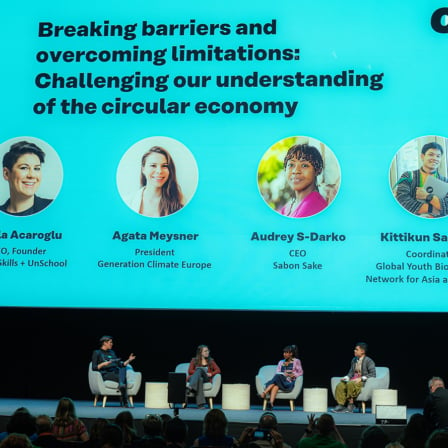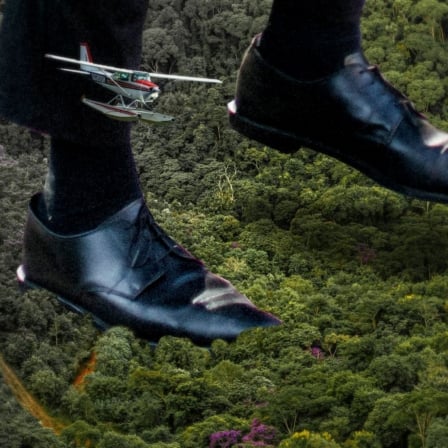The first day of the World Circular Economy Forum 2023 focused on nature and youth. The leading annual event to advance the circular economy attracted some 2,000 people to Helsinki, Finland with about 6,000 people from 143 countries participating online.
Circular solutions can spur economic growth while saving and regenerating nature by fighting pollution, climate change and biodiversity loss. These are multi-generational problems, so youth leaders must be involved in crafting long-term solutions.
“The people at the Forum are motivated and encouraged, but there is a feeling of concern that we aren’t where we need to be,” says Hege Louise Guttormsen, higher executive officer at Nordic Innovation, co-host of the event. “There is a sense of urgency at WCEF, but that is a good thing.”
“We are not transforming fast enough. To do that, we need a critical mass onboard,” confirms Emma Sairanen, project coordinator for sustainability solutions at Sitra, co-host of the event. “Like we heard today, there’s still a lot of push back from decision makers and conservative interest groups for great ideas like paying farmers for ecosystem services.”
The WCEF is always a fantastic place to hear about innovative solutions, but there are always surprises and interesting twists. For instance, cross-sectoral solutions like agroforestry – land use systems combining the management of trees and crops or livestock – broke through old traditions of treating each industry separately.
“The triple planetary crises affect the whole globe, and we often think of the circular economy A carbon-neutral circular economy An economic system that works on a carbon-neutral basis – i.e. produces net zero emissions – and has adapted to the earth’s carrying capacity and the planetary boundaries. Open term page A carbon-neutral circular economy as a global solution,” Sairanen points out. “However, today we have heard over and over again that the best circular solutions are often local. They use local knowledge and local resources, while respecting local culture and ecology.”
My message to young people is: be engaged!
Emma Sairanen, Sitra
Some of the young leaders at the event came from the Global South and had strong opinions on the impact the exploitative linear economy has on their communities, like mining for indigenous peoples.
“The audience seemed to resonate with how the speakers challenged business and government,” says Guttormsen. “It is important that these young leaders were not simply ‘allowed to speak’ but rather given the space to co-create a session to convey their varied perspectives.”
“My message to young people is: be engaged!” says Sairanen. “Your contribution is valuable.”
Many of the topics at WCEF were about actions we can take to advance a circular future. Much of the attention was on consumption: in fact, humans are often simply referred to as “consumers” in some contexts.
Guttormsen and Sairanen stress our consumption can have major impacts. For example, according to a YouGov survey people might know about sustainable options but don’t necessarily take them. However, all responsibility should not be on the “consumer”. Governments and businesses can dictate what consumption options are available to people.
We must rethink what a prosperous life really is. ‘Sufficiency’ is not just a bare minimum, but a good life
Hege Louise Guttormsen
“Listening between the lines, I feel many of our speakers were stressing that the circular economy is a tool, not the end goal,” says Sairanen. “The end goal is reducing resource extraction and securing a thriving biosphere and prosperous communities. While we need to urgently put the ideas we have in practice already today, we also must keep on evaluating if our solutions are really taking us towards these end goals.”
“We must rethink what a prosperous life really is. ‘Sufficiency’ is not just a bare minimum, but a good life,” says Guttormsen. “We must think how to live a purposeful life, not an extravagantly wasteful life.”


















Recommended
Have some more.